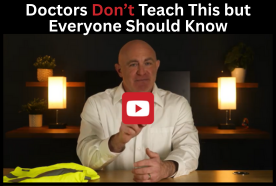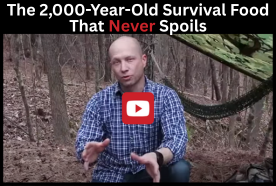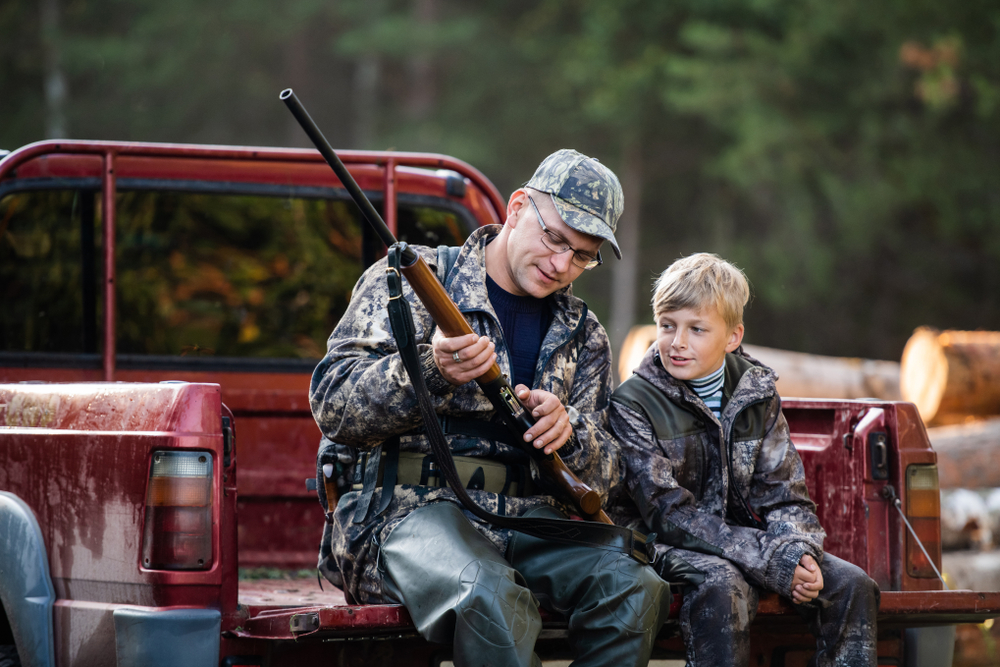We pass on values, traditions, stories, and heirloom tools, firearms, knives from one generation to the next. Aspects of preparedness run much deeper than supplies.
Values are something every good parent teaches their children. In addition to my parents and grandparents, I benefited from mentors in the scouting program, my church, school, and later college and work. One of them was a man named Stephen R. Covey, and he taught me about values and the principle center. (Covey, 1989)

The Principle Center
Correct principles are values such as hard work, honesty and quality that are universally accepted as true. Virtually every culture and religion teach essentially the same correct principles.
When we center our lives on money or possessions, our lives can become destabilized if they are lost, stolen or destroyed. People aren’t a stable center either because people can change or die, and when we center our lives on other people, we empower their weaknesses to control us. Power and fame aren’t stable centers either, as they can be lost. If we center our lives on any of these things, we are like the foolish man who built his house upon the sand.
Correct principles are a stable center. They can’t be lost, stolen or destroyed and they don’t die or change. When we center our lives on correct principles, we are like the wise man who built his house on a rock.
The principle center is a stable life center and provides us with a moral compass as we navigate life’s major decisions. In addition to protecting and providing for our children, we must also equip them with a base of correct principles on which to center their lives. (Covey, 1989)
Kids Learn Best by Example
It is a sobering reality for parents that our children watch our every move. At certain ages a child is a mirror. Children repeat our same words and emulate our habits for better or worse. It can be humbling to hear your child repeat something you said in anger or frustration.
It may not always seem like your kids are learning from your example, but rest assured, they are soaking it all in, so be mindful of the fact that they are watching and will mirror your actions. Approach every word or action as an opportunity to program your child and say or do what you would like them to say or do one day, because chances are, they will.
We also pass down traditions and knowledge.
The Heuristics of Traditions
Heuristics are essentially “rules of thumb”. They are often enshrouded in traditions that we benefit, although we may not be able to explain how or why. (Taleb, 2012)
Virtually every culture developed traditions of hygiene, many of them long before the invention of the microscope gave man an understanding of microbiology and the microscopic pathogens that good hygiene practices keep out of our bodies. They couldn’t have explained to you precisely why or how their cultural hygiene traditions benefited them, but over generations of collective tinkering, many cultures figured out that people who washed and didn’t leave food laying around were healthier. Over the generations, traditions of hygiene were added to their cultural memory or knowledgebase.
Knowledge
We pass down knowledge in the form of traditions, cultural memory, and habits. We also pass it down more specifically in the form of letters, journals, genealogy, family history, stories, photographs, and now digital files and images.
Recipes
Recipes are another type of ancestral knowledge or ancestral heuristics that we benefit from.
Nassim Nicholas Taleb wrote the following about recipes:
“And we can observe ancestral heuristics at work: generations of collective tinkering resulting in the evolution of recipes. These food recipes are embedded in cultures.”
Nassim Nicholas Taleb (Taleb, 2012)
Stories
Human beings are story tellers. The human brain loves a good story and rewards it. Just look at how we choose to entertain ourselves. A significant portion of our brain is structured to tell, hear and remember stories.
Stories are an important part of both our collective cultural memories and of the human condition. History is a collection of stories. Stories help our ancestors live on and help us benefit from the lessons of history. Without them, we are deprived of those who came before us and doomed to repeat their mistakes.
Benjamin Franklin said:
“Experience keeps a dear school, yet fools will learn in no other.”
Benjamin Franklin (Franklin, 1732)
Heirlooms are part of our heritage. They serve as mementos, physical tokens that remind us of experiences, places, people and lessons.
Tools
Any of my grandparents could build or grow anything they put their minds to. All of them were descendants of pioneers and they all came from farming or ranching families.
My grandparents all left tools to their grandchildren, and it is very meaningful to use them. Using my grandmother’s wheat grinder fills my mind with memories of fresh baked wheat bread, and butter, apricot jam and apple butter canned in her canning kitchen from fruits grown on trees on the property.
One day I was working on a boat with my paternal grandfather. He made a mold and poured the fiberglass hull himself. Then he pulled a V-8 from an Oldsmobile and installed it in the boat. We work working on the carburetor when he needed a screw.
In my young mind, I thought, “Oh, we need a screw, so we’ll have to go the auto parts store.” Instead, be put out a little piece of brass and his tap and die set and made the screw we needed on the spot. It is surely a simple thing for a machinist to turn a screw, but it blew my young mind. Up until that moment, I had imagined that screws must only be made in factories by great industrial machines before being packaged and shipped to stores.
That day, by his example, my grandfather taught me a simple lesson, but that small lesson changed my vision and changing my vision changed my attitudes and behaviors for the rest of my life. In that moment, I experienced a paradigm shift. I understood that I could make what I needed instead of buying it from a store.
Buy the best tools you can afford. If you purchase wisely, you will use them all your life and then pass them down to your children and grandchildren.
John Ruskin said about purchasing foolishly:
“There is hardly anything in the world that some man cannot make a little worse and sell a little cheaper, and the people who consider price only are this man’s lawful prey.”
Either John Ruskin or J.A. Richards (Richards, 1901) (quoteresearch, 2020)
Firearms
Purchasing the best quality you can afford goes for firearms as well as tools. They too will be passed down from one generation to the next. Collectable firearms tend to increase in value as they age, but the sentimental value will far exceed their market value if they remind you of adventures and pleasurable outdoor recreation in the company of loved ones.
Knives
The same advice goes for knives. On Sundays, I carry a small German lobster pattern gentleman’s knife. My maternal grandfather purchased in Germany just before the outbreak of WWII while there as a missionary in his early 20’s. He carried it for the rest of his life and passed it down to me.
Long before the term everyday carry came into use, he taught me that boys and men should carry a pocketknife and a handkerchief. I can’t tell you how many times it has been a comfort to be able to offer someone a handkerchief or how many times I have used my pocketknife. Every time I reach for either one, I remember my maternal grandfather and what an outstanding role model he was in every way.

Another knife I carry is a Victorinox model that is not sold anymore. It is similar to the Explorer. My father bought it for me in Interlaken, and had it monogramed for me, while we were on a trip to the Switzerland. I carry it daily. In fact, it is in my pocket right now. The knife reminds me of hiking in the Swiss Alps and of many trips I have carried it on since.
I hope that one day these knives will remind my son of me and lessons passed from grandfather to grandson and father to son.
Supplies will spoil one day, but values, knowledge, traditions, and heirlooms will be passed from generation to generation. These moral, spiritual and cultural aspects of preparedness run far deeper than mere supplies.






References
Covey, S. R. (1989). 7 Habits of Highly Effective People. New York: Simon & Schuster.
Franklin, B. (1732). Poor Richard’s Almanack. Philadelphia, Pennsylvania: Benjamin Franklin.
quoteresearch. (2020, May 21). Quote Origin: There Is Nothing in This World That Someone Cannot Make a Little Worse and Sell a Little Cheaper. Retrieved from quoteinvestigator.com
Richards, J. (1901). Section: From “P.A.’s” Point of View (Excerpt from a letter to the editor written J. A. Richards of New York). Profitable Advertising: The Advertiser’s Trade Journal, Volume 10, Number 9, 636.
Taleb, N. N. (2012). Antifragile: Things That Gain From Disorder. New York: Random House Publishing Group.
Read full article here


